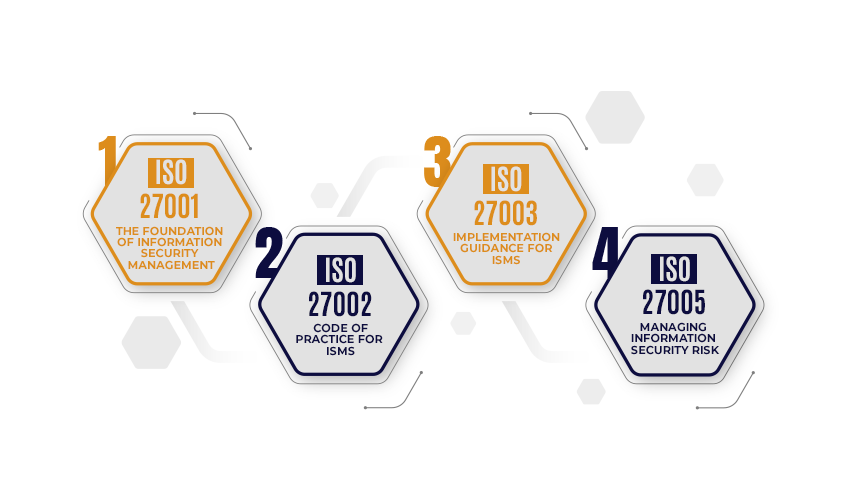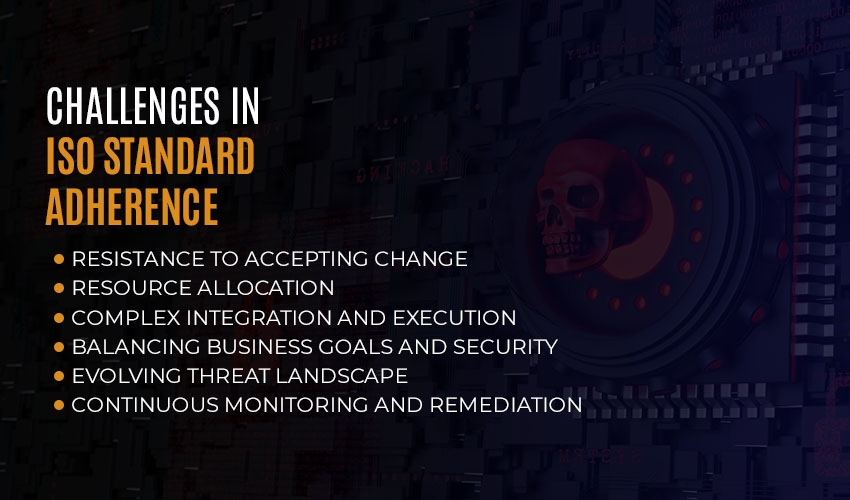
Security Risk Assessment - An Unavoidable Check for Businesses
When encountering a natural or man-made disaster, organizations' existing IT security controls play the most crucial part. Businesses focusing less...
Learn More
In the rapidly evolving digital landscape where advanced technologies such as Artificial Intelligence (AI), Deep Learning, Machine Learning (ML), Blockchain, cloud security, and others dominate every industry, businesses face a formidable challenge: surge in digital risks. With a cyber attack happening every 39 seconds, the vulnerability of organizations visibly tends to increase.
Concerning the skyrocketing cyber attacks, global regulatory bodies are strengthening legal frameworks to hold businesses more strictly accountable. Prominent among these are the International Organization for Standardization (ISO) set cyber security ISO standards, namely, ISO 27001, 27002, 27003, and 27005. These are comprehensive and structured frameworks for businesses outlining cybersecurity measures they should take to achieve compliance.
This article will navigate you through stringent ISO standards for cyber security.
Established in 1947, ISO is an international and independent Geneva-based organization that plans and develops cybersecurity standards to ensure the quality, safety, and efficiency of businesses. In the realm of cybersecurity, ISO has rolled out a series of guidelines aiming to navigate enterprises through complex regulatory compliance practices, data protection tactics, and overall information security management.
Keep reading to learn more about the series of cyber security standards iso.

Jointly put forth by the International Organization for Standardization (ISO) and the International Electrotechnical Commission (IEC) in 2005, ISO 27001 cyber security standard is among the internationally accepted and best-known practices for Information Security Management Systems (ISMS). ISMS refers to the set of procedures, processes, policies, and controls for systematically managing businesses’ sensitive information. It also ensures the protected availability of data in addition to integrity and confidentiality.
ISO 27001 cyber security standard provides a risk-based methodology for your business to identify, assess, manage, and prevent information security risks. This standard is not a one-size-fits-all solution; instead, provides comprehensive guidelines for varying business goals, internal structures, and risk profiles. Key components of IEC 27001 cyber security ISO standards include:
1. Identification of assets
2. Risk assessment
3. Risk treatment
4. Remediation Support
5. Continual improvement
While ISO 27001 outlines the ISMS framework, ISO standard 27002 for cyber security provides a comprehensive set of guidelines for implementing specific information security controls. This standard covers a broad spectrum of security areas, including access control, cryptography, physical security, incident management, and more.
Essentially, ISO/IEC 27002 serves as a reference guide, offering organizations a roadmap to select, implement, and manage security controls tailored to their business goals and data protection needs. By following and abiding by cyber security ISO standards’ guidelines, you can enhance your enterprise’s ability to shield sensitive information against external threats.
Developing and maintaining effective ISMS can be complex, requiring a structured and well-defined control implementation approach. ISO standards 27003 for cyber security provides a detailed roadmap with course of action in accordance with principles outlined in ISO/IEC 27001. It is a step-by-step guide for your businesses to navigate intricacies of establishing an effective ISMS.
Furthermore, ISO/IEC 27003 covers various aspects of ISMS implementation, including:
1. Project Initiation
2. Scope Definition
3. Threat Assessment
4. Risk Profiling
5. Strategy Development
6. Selection and Implementation of Security Controls
By offering a systematic approach, this standard assists businesses in streamlining the data security controls strategy execution process. Ultimately, ISO standards 27003 for cyber security empower organizations to take action to reduce the likelihood of oversights and ensure a more resilient and sustainable security posture.
Risk assessment, management, and mitigation are the most fundamental aspects of cybersecurity, and ISO 27005 will enable your organization to identify and prevent external threats effectively. This standard assists IT teams in assessing and managing information security risks possessed by current processes, controls, policies, or procedures. By aligning with ISO standards 27005 in cyber security, you can develop a robust risk management framework for your organization that integrates seamlessly with its overall ISMS.
ISO standards 27005 in cyber security guidelines take an organization's objectives, stakeholders, and external factors into account for effective risk management. Hence, you can make informed prevention and remediation decisions and implement required security controls to improve ISMS efficacy and position your organization ahead of evolving cybersecurity threats.
ISO cyber security standards adoption offers a multitude of benefits to businesses committed to securing their digital assets. One of the primary advantages is the establishment of a common language and framework for discussing and addressing information security. This standardized approach facilitates communication both internally, among different departments, and externally with business partners and stakeholders.
ISO standards for cybersecurity also help organizations improve and retain their credibility by demonstrating a commitment to integrating best information security practices. Industries like healthcare, government, finance, and education deal with tons of sensitive information every day. Therefore, their adherence to ISO cyber security standards presents them as secure, reliable, and authentic in the global market as well as among clients.
While the benefits of adhering to ISO cyber security standards are clear, organizations may encounter challenges in the implementation process. One common hurdle is the allocation of resources, both in terms of time and finances. Another is the resistance to change as well as the dynamic nature of the threat landscape, and more.
The next section further discusses the challenges and considerations businesses face in achieving adherence to cyber security ISO standards.

In adapting to new standards and integrating different controls for ISMS, you may face resistance from employees, stakeholders, or other affiliates. Upgrading in-house data security processes requires effective communication, training programs, and a concerted effort to foster a culture that values protection.
One of the primary challenges, especially for SMEs, is the allocation of resources, which can be both time and finances. Establishing and maintaining compliance with cyber security ISO standards, especially ISO/IEC 27001, requires a dedicated investment, which organizations must carefully balance against other business priorities.
Building a robust ISMS in adherence with ISO/IEC 27001, as well as aligning with related standards like ISO/IEC 27002 and ISO/IEC 27003, can be tricky and time-consuming. However, defining the scope, conducting risk assessments, and selecting appropriate security controls can help you overcome these challenges.
Striking a balance between stringent security measures and overarching business objectives is crucial. You must ensure that your organization’s security practices align with the overall strategic goals and do not hinder day-to-day operations.
The cyber threat landscape is dynamic and ever-evolving, tossing sophisticated security risks for businesses. This requires organizations to keep an ear to ISO standards regular updates and integrate them straight away to remain a step of cyber bad actors. Businesses must stay informed about changes to the standards and be prepared to adapt their security practices accordingly.
Maintaining a proactive stance in the face of evolving threats requires continuous monitoring and improvement. Organizations must establish processes for regular risk assessments, security audits, and updates to security controls to ensure continuous upgradation of ISMS and sustain its effectiveness.
As businesses navigate the digital frontier, the utmost importance of integrating effective and sustainable cybersecurity measures cannot be overstated. ISO cyber security standards provide a structured and comprehensive framework for organizations to establish, implement, and continually improve their information security practices. ISO/IEC 27001, ISO/IEC 27002, ISO/IEC 27003, and ISO/IEC 27005 collectively form a powerful suite of standards that, when implemented effectively, can fortify an organization's defenses against a myriad of cyber threats.
Collectively, adherence to these standards empowers businesses to position themselves at the forefront of information security. In a world where the digital landscape is constantly evolving, ISO standards serve as a beacon, guiding organizations toward a safer and more resilient future.
Being an emerging leader in IT security, network, and infrastructure certifications, we offer dual assistance to businesses seeking a more secure digital frontier. Our result-driven auditing services assist organizations, regardless of their size, in identifying areas that hinder adherence to ISO cybersecurity standards, devise remediation strategies, and ensure their integration. Furthermore, we offer EC council, PECB, ISACA, and IAPP-approved cybersecurity courses that train IT professionals with the required expertise to guide their organizations through the stringent and complex ISO landscape.

When encountering a natural or man-made disaster, organizations' existing IT security controls play the most crucial part. Businesses focusing less...
Learn More
On average, around 2,200 cyberattacks are launched every day. The increased usage of cloud solutions, third-party transactions, and overall digitiz...
Learn More
In an era of interconnected technologies, the digital landscape presents both unprecedented opportunities and formidable challenges. As organizatio...
Learn More
In the current era of advanced technology, where cyber-criminals and hackers are finding new ways to infiltrate systems and steal sensitive data, e...
Learn More
The results of a joint study by Jeff Hancock (Professor at Stanford University) and Tessian, a security company, show that human error or employee ...
Learn More
The cybersecurity industry has recently undergone rapid growth and global-level expansion like no other sector, estimated to grow from $190.5 billi...
Learn More
The digital age has significantly increased the challenge of m...
Learn More
Our digital world is a double-edged sword. While it offers incredible opportunities, it also exposes us to unseen dangers. Cybersecurity fundamenta...
Learn More
Vulnerability assessment is the systematic review of network ...
Learn More
In the dynamic and constantly evolving field of cybersecurity, maintaining a proactive stance against emerging threats necessitates a comprehensive...
Learn More
Obtaining industry-recognized certifications is a powerful way to showcase your expertise, enhance your credibility, and unlock new caree...
Learn More
In today’s digitally-driven world, cybersecurity has become a critical component for organizations across all sectors. The growing ...
Learn More
Have you ever wondered how you can become a cybersecurity expert and significantly advance your career? If yes, ...
Learn More